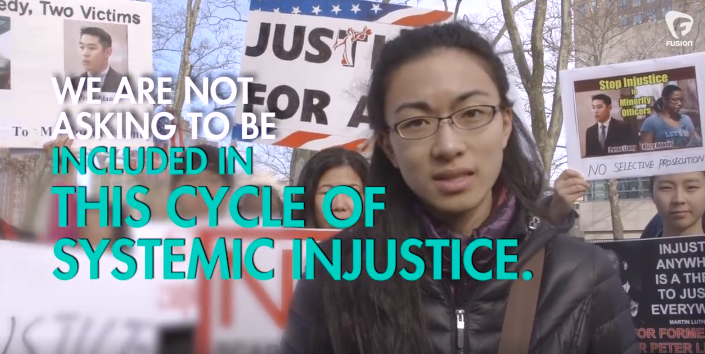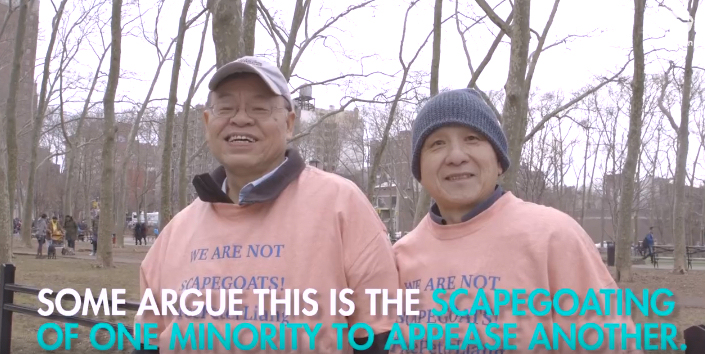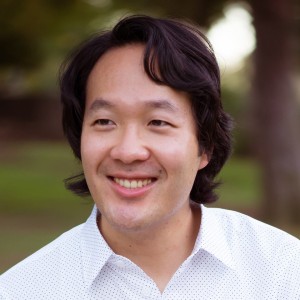
By Guest Contributor: Timmy Lu (@timmyhlu)
This post was first published on Facebook, and has been adapted for publication on Reappropriate.
There’s a widely shared and watched video floating around the web (after the jump) that features a Chinese American woman speaking at protests organized after a jury found Officer Peter Liang of the NYPD guilty of manslaughter in the killing of Akai Gurley.
It’s a slick and convincing video that uses the kind of politically correct, in vogue language that typically appeals to many Chinese and Asian American progressives like myself.
The message is also absolutely wrong.
22-year-old ABC on Peter LiangListen to a 22-year-old American-born Chinese woman explain why she’s angry over Peter Liang’s conviction.
Posted by Fusion on Monday, February 22, 2016
In the video, Jess Fong speaks passionately and powerfully about White supremacy and the injustice of a system that lets White officers off the hook for killing Black people. She then pivots with an unsaid “but” to the central demand of the protests: leniency in Liang’s sentencing.
Black Lives Matter. Full stop. There can be no “buts”, or redirects, or clever rhetorical tricks. Akai Gurley mattered, yet Peter Liang took Gurley’s life. A jury deemed that shooting an accidental killing, and so convicted Liang of the appropriate charge of second-degree manslaughter. There is no “somebody else’s life matters, too” in this story. Gurley’s life was the only one that was unnecessarily taken away.
Communities impacted by oppression should speak for themselves and should be the center of crafting the demand for justice — this is one of the pillars of the environmental justice movement, in which I work. Black people across the country are demanding an end to police violence. That call is not about holding only White cops accountable, but about holding all cops accountable.
When protesters demand that Peter Liang be freed and call him a “scapegoat”, you reject solidarity with the Black community. You instead suggest Liang did nothing wrong or, more insidiously, that his prosecution was only because of Black protest; as though nationwide, Black people are marching in the streets demanding that only Asian cops be held accountable! (Hint: they’re not, and it’s not about you!)

You cannot claim allyship when you frame a victim (Gurley) as equal to his killer (Liang), and then you elbow your “One Tragedy, Two Victims” sign up to the front. If protesters want to sympathize with Gurley’s family, you should support the Gurley family’s call for justice. You can fight other instances of police violence against Black people. You can show up in the streets and get your bodies in the way of the White supremacist system you claim to hate and that oppresses you too. It is true that punishing Peter Liang will not topple the system. But, damn fellow Chinese people, getting Liang off the hook will never get justice for Akai Gurley.
So what is this about?
This is partially about the political opportunism of Chinese conservatives, who would unquestioningly support the police, landlords, and business interests anyway. As a political force, these conservative Chinese have no interest in racial justice and would end affirmative action because they think it unfairly benefits Blacks and Latinos and hurts more “deserving” Chinese. These are the die-hard nationalists of the Chinese American community, who would strive to end White privilege and replace it with class and socioeconomic privilege — nice neighborhoods, education, wealth. These people alone won’t turn out in the thousands, but they have enough infrastructure to encourage and compel others to.
Chinese national identity over the last several decades has finely tuned Chinese people to the history of Chinese humiliation by the West. It’s a sentiment easily accessed and readily tied to the exclusion that many Chinese immigrants feel about American politics and society. Among immigrant Chinese, the feeling of being just visitors – or, human “bridges” (??) to the homeland — is still very real. I’m therefore not surprised that when some Chinese people feel victimized or targeted, my people will rally. But too often they don’t rally for justice for all, but justice for themselves. That’s what exclusion does: it forces you to turn inward, to trust only your own people even when they steal your wages or evict you, or to put your head down and play the game so that you can get the privileges of class and maybe Whiteness.
Toss in implicit bias, latent racism, anti-Blackness, or whatever you want to call the prejudicial beliefs inherent in feudal cultures or American ideology, and what emerges is a rotten stew that spoils any attempts at solidarity. So when Chinese Americans speak at a Peter Liang rally about White supremacy, they can only do so from the perspective of their own struggles as a Chinese American.
My day-to-day work is about organizing Asian Americans into a progressive political bloc that fights oppression in all its forms. I’ve been thinking a lot about the idea of a New American Majority. That is: a political force of Black, Latino, Asian, Native, Pacific Islander and progressive White voters that transforms American politics in the next century. Civil rights lawyer Steve Phillips breaks this down in detail in his new book “Brown is the New White”. So for me, the question of what these demonstrations are really about is an important one. In the protesters now mobilized to consider Whiteness and racism, I see great possibility, but frankly that possibility is still held back by narrow self interest.
As the country shifts to become a majority people of color, the most important question for us is: “Chinese people, who’s side are you on?” Because there is no “Chinese” side of justice.
“A system that doesn’t value Black or Brown lives doesn’t value Asian lives either.”
#Justice4AkaiGurley #BlackLivesMatter

Asian Pacific Environmental Network (APEN) where he organizes Asian American communities for environmental and economic justice. He is also a member of Asians for Black Lives.
Learn more about Reappropriate’s guest contributor program and submit your own writing here.
